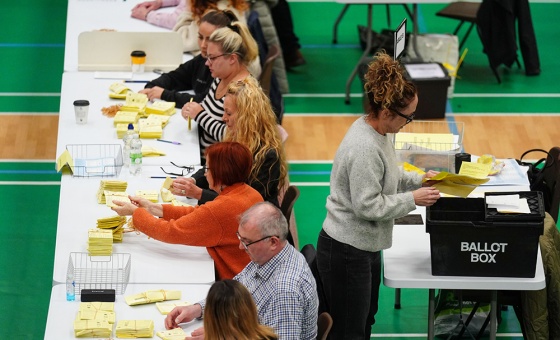This is the last article you can read this month
You can read more article this month
You can read more articles this month
Sorry your limit is up for this month
Reset on:
Please help support the Morning Star by subscribing here
DANIEL ELLSBERG, who inspired the Vietnam generation of the ’60s and ’70s to bring the Pentagon Papers out into the world, died last week of pancreatic cancer aged 92.
The Pentagon Papers, a Rand Corporation study commissioned by defence secretary Robert McNamara and submitted in 1968, showed the Vietnam war was unwinnable. And yet the United States continued futilely, killing tens of thousands in South Vietnam and enlarging it to an air war against North Vietnam and Cambodia.
In November 1969, Seymour Hersh broke the story of the My Lai massacre. Ellsberg, who had photocopied the Pentagon Papers at around the same time, tried unsuccessfully for two years to get members of Congress to raise this issue. His recourse was to go to the press, though knowing it could land him in jail for a good portion, if not all, the rest of his life.
Ellsberg was in his early forties with a brilliant career ahead. He was a civilian but held one of the highest security clearances in the United States.
The Establishment found his “betrayal” of the security state inexplicable. No insider at his level ever defected from the security state, before or after him.
Ellsberg escaped conviction for leaking government secrets — not because the judiciary was kind to whistleblowers. Then-president Richard Nixon was anxious about what else Ellsberg might release regarding his and Kissinger’s threats of using nuclear bombs against North Vietnam.
Nixon created an illegal team known as the White House Plumbers, officially the White House Special Investigations Unit. It was tasked with breaking into the office of the psychiatrist treating Ellsberg to find something that could destroy his credibility. They failed to find anything worthwhile.
The exposure of the same White House Plumbers breaking into the Democratic Party Headquarters at Watergate finally brought Nixon down.
The expose damaged the United States government’s case against Ellsberg beyond repair, letting him walk free. The Vietnam war finally ended when the liberation forces captured Saigon, with helicopters lifting off from the rooftops of the United States embassy and other “safe houses.”
While the Pentagon Papers leak made Ellsberg famous or, in the eyes of the United States Establishment, infamous, he had even more damaging documents that, he was quite sure, would lead to him spending the rest of his life in prison.
It was his discovery that the United States had built a “Doomsday Machine” that could, with a single human or technical failure, unleash the destruction of the world.
He decided to keep the Doomsday Machine documents safe while first releasing the Vietnam documents, as the anti-Vietnam war movement was gathering momentum.
Unfortunately for him, the papers, which were with his brother, were destroyed in an accident. He could write about their contents but no longer had the substantiating documents. Most of these documents reached the public domain in the last 50 years.
We do not have another example after Ellsberg — somebody who rose to the highest ranks in the security Establishment — and then defected to the people with their secrets. But the leaks have continued.
The same security state’s hunger for information, and the digital infrastructure it has built to collect and centralise it, have grown exponentially.
And so have its vulnerabilities. A large number of people can access this information today, not because they are at the core of the security state but because many lowly techies are needed to maintain such systems. This is the Achilles’ heel of the security state. That is why Chelsea Manning, Edward Snowden and Jack Texiera can leak information meant only for the highest echelons of the United States government.
Julian Assange’s contribution was based on his understanding of modern technology and that many more people can access secretive information. Both these mean that information could now be “exfiltrated” from the bowels of the security state.
He knew an infrastructure that could share this information would radicalise the world. Ellsberg needed two years to make his knowledge of the futility of the Vietnam war public. Assange’s WikiLeaks made it possible to do this almost instantly. That is how WikiLeaks showed us the Collateral Murder video Manning had sent, in which United States helicopters are shooting down two Reuters reporters in Baghdad.
The Ukraine war has also brought to the fore Ellsberg’s other concern: the United States’ military “Doomsday Machine,” prepared for a first strike against an “enemy” while hoping its own missile shield would take out a weakened retaliation by any “enemy.” This was a blueprint for a winnable nuclear war, not mutually assured destruction.
In answer to a question prompted by Ellsberg in 1961, the joint military chiefs revealed their estimate of the total death toll from a United States first strike aimed at the Soviet Union, its Warsaw Pact satellites, China and all other countries — “roughly six hundred million dead.” Or one-fifth of the world’s population in 1961 when the nuclear arsenal was much smaller and the bombs far less powerful. Today, make no mistake, it would end the world as we know it.
The Ukraine war between Russia and Nato — where Ukrainian soldiers fight, but Nato supplies the weapons, ammunition, armour, missiles and full operational theatre support — brings us to the brink of a nuclear exchange.
Such a conflict between Russia and Nato can be triggered by a misunderstanding or a simple accident. In the past, a flock of geese and a full moon triggered missile strike alerts, and it can happen again.
That is why we must remember Ellsberg and his lifetime spent in the struggle for global peace. Though he is no longer with us, his commitment and goals never mattered more to the peace movement.
This is an edited version of an article that appeared at peoplesdispatch.org.











